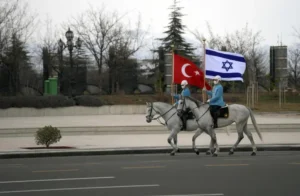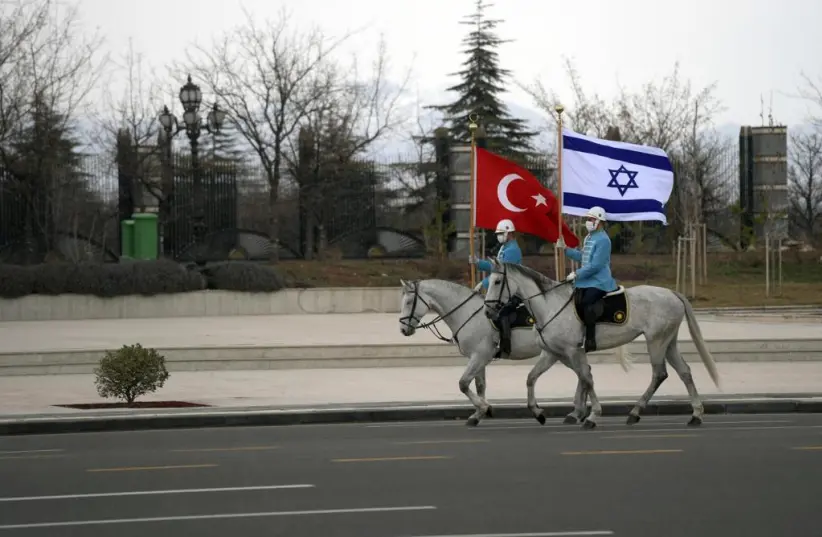Israel’s National Security Council issued its most severe travel warning for Turkey, putting it on the same level as war-torn states like Afghanistan and Yemen.

In a scene straight out of the espionage thriller Fauda, Israeli security forces evacuated Israeli citizens from their Istanbul hotel last week, allegedly ahead of an Iranian hit-squad that was intent on kidnapping or killing them.
The real-life drama played out amid reports that the Iranians were targeting Israeli tourists in Istanbul as retaliation for last month’s murder of Hassan Sayyad Khodaei, a Revolutionary Guard colonel, which Iran has blamed on Israel.
But far from sowing panic, the evacuation order and subsequent warnings were met by confusion, and some apathy, on the ground in Turkey among both local Jews and Israelis visiting the country. The warnings come at a time when Turkish-Israeli relations are warmer — or at least less chilly — than they have been in over a decade. Earlier this year, Israeli President Isaac Herzog met with his counterpart, Turkish President Recep Tayyip Erdogan, and last month, Turkey’s foreign minister traveled to Jerusalem to meet with his Israeli counterpart, Yair Lapid.
(Lapid had announced Sunday that he would be traveling to Ankara for another meeting this week but it is unclear whether the dissolution of the Israeli government and Lapid’s ascension to interim prime minister will affect those plans.)
Israel reportedly put off issuing the warning for some time in order to give Turkish authorities a chance to resolve the threat internally. Ultimately the evacuation was done in cooperation between Mossad and Turkish authorities, whom Prime Minister Bennett praised this week.

“The operational efforts alongside Turkish security forces have borne fruit,” Bennett said.
“In recent days, in a joint Israeli-Turkish effort, we thwarted a number of attacks and a number of terrorists were arrested on Turkish soil.”
Prime Minister Naftali Bennett
Israel’s National Security Council also issued its most severe travel warning for Turkey, putting it on the same level as war-torn states like Afghanistan and Yemen — as well as Iran.
“If you are already in Istanbul, return to Israel as soon as possible,” Foreign Minister Yair Lapid said on June 13. “If you planned a trip to Istanbul — cancel it. No vacation is worth risking your lives for.”
“The State of Israel’s security forces are doing everything [in their power] to thwart these attacks and to neutralize the attackers and their operators,” Prime Minister Bennett said the next day. “We will not hesitate to use the power of the State of Israel anywhere in the world, for the protection of our citizens.”
As the week went on, warnings from Israel only became more dire, though it was reported that several of the Iranian cells were neutralized by Israeli and Turkish forces.
On Friday, Israel called on its nationals in Turkey to lock themselves in hotel rooms and be wary of opening the doors even for service staff and delivery people.
“I call on all Israelis in Turkey to obey the instructions of the security forces,” Defense Minister Benny Gantz said in a statement Saturday evening. “Israel is working to thwart Iranian attempts to carry out an attack, and is preparing to respond forcefully to any attack on Israeli citizens — anywhere.”
For Israelis on the ground however, the warning has elicited a more subdued response.
“Honestly, I just heard about it from the news,” Itay, an Israeli living in Turkey, told the Jewish Telegraphic Agency. He asked that his last name not be shared for safety and privacy reasons.
He says he has felt little reason to change his routines and does not know any other Israelis who have either.
“I’m not screaming in Hebrew or something like that, of course. But if someone asks me where I’m from, I will always say from Tel Aviv,” he said.
Rabbi Mendy Chitrik, Turkey’s Ashkenazi chief rabbi and a Chabad-Lubavitch movement emissary who deals with dozens of Israeli tourists weekly, said he was inundated last past week with messages from local Israeli expats and Israeli travelers asking for advice.
“When people call me, and ask me if they should come, I say they should refer to the security instructions of their government and try to comply with that,” he said.
Nonetheless, he has seen little change.“I walk on the streets of Nisantasi [one of Istanbul’s hip shopping districts], and still hear Israelis speaking,” he said.
Chitrik said he had no direct knowledge of how many individuals have decided to change their plans to travel to Istanbul based on the warnings. However, as the director of kosher supervision operations in Turkey for both the Israeli and Turkish rabbinates as well as the U.S.-based Orthodox Union, Chitrik noted that the number of kosher meals ordered for Turkey-bound airline flights has not seen any decline.
According to the Israeli news site Walla, some 3,750 people on 21 flights departed from Israel to Turkey on June 13 despite the warnings. However, that also includes those just passing through Istanbul airport, the second busiest in Europe, which was not included in the warning.
Overall, Chitrik does not envision much change in his regular routine either.
“As a rabbi, a person of faith, we trust, first and foremost, in God, and then we also trust in the authorities of Turkey that they protect their citizens and Jewish community and also the millions and millions of tourists that come to Turkey,” he said.
In their coverage of the affair last week, Israeli media seemed hard pressed to find anyone who actually heeded the warning to leave the country, though The Times of Israel reported that many did shelter in their hotel rooms after Friday’s warning.
Israeli expats are far from the only Jews in Istanbul, home to a 15,000-strong Turkish-Jewish community.
The community has also been a target before over Israel tensions, notably in 1986, when a Palestinian gunman opened fire on Istanbul’s flagship Neve Salom synagogue, killing 22. In 2003, two car bombs exploded outside of Neve Salom and another synagogue in the city, killing 28. The 2003 attacks are believed to have been the work of Al Qaeda.
Nonetheless, Turkey’s Sephardic Chief Rabbi Ishak Haleva publicly urged Israelis to continue to visit Turkey, despite the warnings of Israel’s foreign ministry.
“There was an issue that occurred, [and] the State of Israel rose to its feet – and rightly so,” Haleva said in an interview with The Jerusalem Post. “Otherwise they would be responsible if something happened and they didn’t warn about it beforehand.”
Nonetheless, he referred to the alleged plot as “a lot more noise than actual threats.”
“I think that Israelis should continue to come and visit. Turkey is a very beautiful country. They can come and enjoy it without making a fuss about it,” Haleva said, “Turkey is beautiful in the summer, so please be our guests.”
Though he also said that, “when talking on the streets, they shouldn’t speak as loudly as they usually do.”
Bennett stressed Monday that despite the arrests, the threat remained active.

